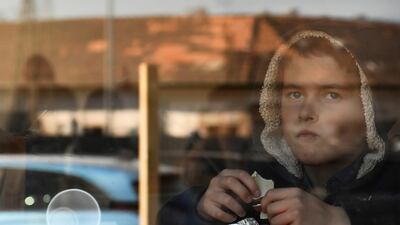Live updates: follow the latest news on Russia-Ukraine
The mayor of Lviv in western Ukraine has criticised refugee agencies for inadequately addressing the country’s humanitarian crisis, accusing them of initially watching the situation “with concern over wine and coffee.”
Andriy Sadovyi said that “not a single foreign or international NGO” was ready for the war in Ukraine “despite the fact that six months ago everyone was talking about that,” the Guardian newspaper reported.
Criticisms of both the UN’s refugee agency - the UNHCR - and the International Committee of the Red Cross (ICRC) were echoed by a number of Ukrainian politicians.
Ukraine’s Deputy Prime Minister Iryna Vereshchuk said the major humanitarian organisations had appeared “disoriented” by the conflict and described the Red Cross as “impotent”.
“We give them a task: Chernihiv or Kherson, the places where it’s difficult for us,” she said.
“Where we can’t negotiate with the Russians, we say just go there yourselves and evacuate people, take buses and go and get people, and they can’t do it.”
Serhiy Kiral, the deputy mayor of Lviv, where a million people have transited since the war began more than a month ago and which came under fire from Russian missiles at the weekend, claimed that the UNHCR had prioritised the safety of its own personnel over the lives of civilians.
He had been surprised when officials in the UN’s refugee agency had described their own staff as “refugees” during conversations with him in the early stage of the conflict.
“In the first two weeks what they were actually telling us here [was] that they were like refugees themselves because they were busy with evacuating their staff personnel from Kyiv, looking for places for them to stay, making sure that they are safe and then psychologically [well]. You know, you don’t expect that from them,” he said.
“As far as the major ones like [the] UN refugee agency, it took us a week probably to get through to the leadership just to find a person to talk to.
“Then another week there was the head of Ukraine country office here meeting the mayor and the deputy mayor talking about the needs and we have laid out what we need, like you know, humanitarian aid, foodstuffs … there were a lot of promises and commitments and then all the way up till today, nothing is happening.”
A two-Michelin-starred chef and humanitarian who has been serving millions of meals to Ukrainians levied similar concerns, saying there was a “lack of leadership” in response to the refugee crisis.
Spanish-American chef José Andrés, who runs non-profit World Central Kitchen and is currently in Lviv, said that the UN and the EU do not have enough “boots on the ground” to deal with the “huge humanitarian emergency at the doorstep of Europe”.
“We need to be expecting more from the big organisations. If not, my question is what do we have them for? What do we spend the millions for?” he said. “We are lacking that leadership.”

According to the latest UN estimates, about 3.8 million people have fled Ukraine since Russia's invasion.
A UNHCR representative said that “no one was prepared for an emergency of this scale and speed”. and that while the safety of their staff was “a priority”, the agency had increased its overall presence in the country since the conflict started.
“The safety of our staff is of course a priority, but this has not led us to reduce our presence in Ukraine. Most of our staff based in Mariupol, Severodonetsk and Kyiv have been temporarily relocated to safer areas, such as Dnipro, Lviv and Vinnytsia, and at the same time, UNHCR has increased the number of staff in country over the past weeks by some 50 individuals [to 154 currently] and continues to recruit more staff to scale up our capacity to deliver a significant emergency programme.”
An ICRC representative said that while some staff had left the country it had about 80 more people in the country than it did before.
Defending itself against criticism for repeated failures to create humanitarian corridors out of bombarded cities like Mariupol, the Red Cross said it could only “facilitate” the establishment of safe passage for refugees but that it was down to the warring parties to agree them.
“We have had discussions with the Ukrainian and Russian authorities for weeks now. This is up to them to agree on specific terms when it comes to humanitarian corridors or safe passage
“They need to be very concrete on the terms of how, when and what needs to happen: agreeing on the road, the timing, for how long it will last, all these guarantees. And from there the ICRC can be requested to facilitate.
“Unfortunately, it is up to them. We can only facilitate. We need to maintain our neutrality. This is the difficult role of the ICRC and at the moment it is why we face a lot of criticism coming from all sides”.






























